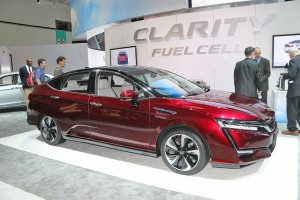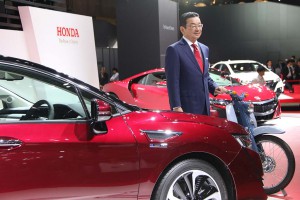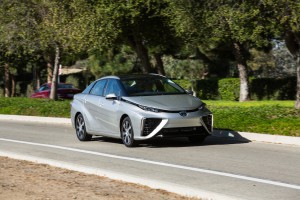
Honda’s new Clarity Fuel Cell sedan might be able to save the environment, but it’s likely to cut into the saving of customers who want to buy one.
The hydrogen car, set to reach U.S. showrooms “before the end of 2016,” will carry a sticker price of around $60,000, according to the Japanese maker, about $2,000 more than the Toyota Mirai fuel cell vehicle launched late last year. But, at $499 a month, the Clarity will go for the same lease rate as the Mirai and a hydrogen-powered version of Hyundai’s Tucson SUV.

“The company will start by leasing vehicles and expects to move to retail sales with increased volumes and market coverage,” Honda said in a news release. Initially, it noted, the Clarity Fuel Cell sedan will be offered only in Los Angeles and Orange countries, and around San Francisco and the California capital of Sacramento.
That’s because of the limited availability of the clean and lightweight fuel. Currently, there are only a handful of pumps open to the American public, almost all of them in California. That state has laid out plans to put a network of at least 100 hydrogen stations into operation by decade’s end, and several other states are considering similar plans. Japan and Germany are also planning to expand the availability of the fuel.

That’s because proponents see hydrogen as the cleanest form of energy. Use it to power a fuel cell stack and you get a flow of electric current – with only water vapor in the exhaust. That power can be used to run the same electric motors found in a battery vehicle. But hydrogen can offer longer range – about 300 miles in the case of the Honda — and Clarity can tank up as quickly as a gasoline-powered vehicle, three to five minutes.
(Tesla exec dismisses hydrogen cars as a “dodge.” Click Here for the story.)
A number of automotive manufacturers have been testing fuel-cell vehicles in recent years. But Honda was actually the first automaker to put one in the hands of consumers. It began leasing a limited run of the original FCX Clarity models in 2005.
But the launch of the new Honda Clarity Fuel Cell sedan was delayed by more than a year, in part due to a shift in engineering resources as the maker dealt with a series of quality and safety issues. As a result, it will become the third automaker to bring the latest wave of hydrogen technology to market, behind Toyota and Hyundai, the latter introducing the Tucson version in 2014.
Once the Honda Clarity comes to market, all three vehicles will be available for lease. But while they carry the same monthly price, the Tucson will come with an “all-you-can-eat” plan that includes unlimited supplies of hydrogen.
Hyundai is only leasing its model, but Honda and Toyota will allow buyers to purchase their fuel-cell models outright, letting them benefit from potential $7,500 federal tax credits.
Despite the limited availability of hydrogen – which is, ironically, the most abundant element in the universe – a number of other manufacturers are expected to bring out their own fuel-cell vehicles soon. As TheDetroitBureau.com reported during the North American International Auto Show this month, that includes Mercedes-Benz. The German subsidiary of Daimler AG already has been fleet testing a hydrogen car in the U.S. The production model is expected to be ready by 2017.
(Click Here for more on Daimler’s hydrogen car plans.)

General Motors has also run extensive fleet tests and holds more fuel-cell patents than any other manufacturer. It is partnering with erstwhile rival Honda on even more advanced technology and as TheDetroitBureau.com reported this week, the two partners are believed to be considering plans to open a joint fuel-cell plant in the next few years.
Ford has joined a similar development consortium with Daimler, Renault and Nissan and the four makers could soon be entering the market, as well.
Not everyone is enamored of hydrogen power, however. Elon Musk, founder and CEO of the battery-carmaker Tesla, has frequently dismissed the technology as “fool cells.”
But many experts believe that both battery and hydrogen cars will find use in the next decade or two, unless and until a truly competitive, green technology comes along that can match the advantages – including range, ease of use and cost – of gasoline-powered vehicles.
(For more on the possible GM-Honda joint venture, Click Here.)








Your readers might be interested to know that the fuel cell propulsion system in the Honda Clarity is actually engineered and provided by General Motors. It is the first tangible result of their “advanced technology” partnership.
Five questions
1. Whats hydrogen going to made from? 2.And is it renewable?
3 How much energy does it take to make hydrogen?
4. How much is it going to cost?
5. Can I fill it up at my house?
When those questions are answered. Until then the bet is on batteries.
All good questions, DWH.
1) While hydrogen is the most abundant element in the universe it does not exist in its pure form on Planet Earth. Thus, it must be produced through any of a variety of ways, such as cracking natural gas or even coal…or by splitting water into its component atoms, most commonly through electrolysis. Hydrogen also can be produced as a byproduct of some other chemical reactions; note that there actually already is a large infrastructure in place in some areas — to produce it, anyway, but not necessarily to distribute it for automotive applications.
2) It can be considered renewable, depending upon the source, ie if you use solar, geothermal or wind power to electrolyze water.
3) That depends upon the way you choose to produce it. Electrolysis is fairly energy intensive. An interesting approach that has been proposed would use excess heat from the new generation of nuclear generators. If I understand correctly, H2O splits on its own when heated to something north of 900 degrees.
4) I have seen all manner of answers to this, in part, because there are so many different production options. The general consensus is $5-10/kilogram of the gas. To give that some perspective, the Toyota Mirai gets about 67 miles per kg. That would — at the figures I quoted — work out to around 8 to 15 cents/miles. A comparably sized gasoline car getting, say 35 mpg, would cost less than 6 cents/mile at the current national average for gas. But if/when fuel returns to $4 or so, as is eventually likely, that would work out to 12 cents or so. Of course, the gas course would have CO2 and other emissions, rather than just water vapor, coming out the tailpipe.
5) There have been prototype systems that would use a home’s natural gas supply to produce H2. It would be cleaner, on a per-mile basis, than using gasoline, but not a true ZEV. Then again, much of the country gets its electricity from coal, and even using natural gas boilers means that’s displacing, rather than eliminating all emissions.
BTW, experts often refer to hydrogen as an “energy carrier,” rather than a true fuel. A fuel, like wood, or coal, or petroleum, essentially comes out of the ground ready to provide energy, even if some refining might be needed. With H2 you have to put in energy to get energy, sometimes more energy in than you can get out.
Paul E.
So despite the baiting by DWH who has admitted he owns Tesla stock and that he routinely tries to manipulate public opinion on impractical EV’s, Paul answered all of his questions proving hydrogen fuel cell powered cars are practical and viable where as battery powered EVs are not practical contrary to the meritless claims of hucksters looking to financially profit from deceiving the public on EVs.
Thanks to Honda for providing the overview on hydrogen fuel cells and why they make a lot more sense than battery powered EVs. Other auto makers are also producing hydrogen fuel cell powered cars for the few who actually desire “green” cars. The only reason however any company but Tesla is producing EVs or hydrogen fuel cell powered cars is because the EPA is holding a gun to the heads of auto makers. The EPA, soon to be gone Obama and the tree huggers want to force their distorted views of the environment on the world. The world has said “NO THANKS” and continues to buy traditional powered vehicles because they are practical, cost effective and reliable.